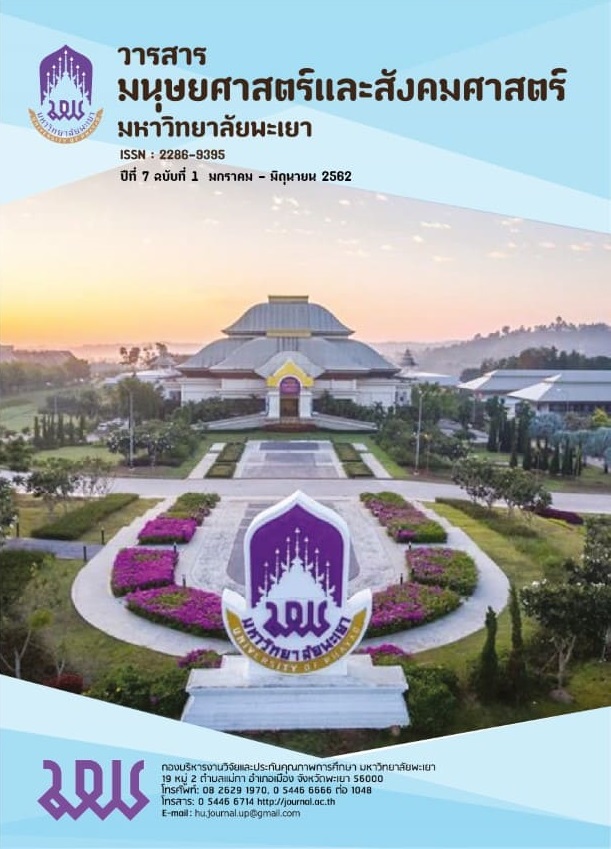The Guidelines of Authentic Leadership Development for Administrators in Basic Education Schools
Keywords:
Authentic leadership, Development of the authentic Leadership, Administrators in basic education schoolsAbstract
This research aims to study the components and guidelines for developing the authentic leadership of administrators in basic education schools. Five professional experts with highly leadership roles are purposively selected for semi-structured interview process about authentic leadership. Document and content analysis is employed as key technique for the study.
The results show that the authentic leadership for administrators in basic education school is comprised of seven components including self-awareness, justice, ethical perspective, transparency, positive thinking, responsibility and capability for keeping pace with global change. In addition, the guidelines for developing the authentic leadership of administrators in basic education schools consists of five methods including self-development, role model, case study, coaching, and training.
References
ฉัตรสุมาลย์ กบิลสิงห์. (2557). ผู้นำกระบวนทัศน์ใหม่ ภาวะผู้นำทางจิตวิญญาณ [ศักดิ์สินี เอมะศิริ, ผู้สัมภาษณ์]. ผู้นำแห่งอนาคต : คุณธรรมการนำร่วม และการเปลี่ยนแปลงภายใน. นครปฐม :โครงการผู้นำแห่งอนาคต ศูนย์จิตตปัญญาศึกษา มหาวิทยาลัยมหิดล, 4–13.
ชัชวาล ศิลปกิจ. (2557). สติกับภาวะผู้นำ [ศักดิ์สินี เอมะศิริ, ผู้สัมภาษณ์]. ผู้นำแห่งอนาคต : คุณธรรมการนำร่วม และการเปลี่ยนแปลงภายใน. นครปฐม : โครงการผู้นำแห่งอนาคต ศูนย์จิตตปัญญาศึกษา มหาวิทยาลัยมหิดล, 15-24.
ธีระ รุญเจริญ. (2556). วิกฤติและทางออกในการบริหารและจัดการการศึกษา. วารสารวิจัยและพัฒนา มหาวิทยาลัยราชภัฏบุรีรัมย์, 8(1), 96-107. สืบค้นจาก http://gradjournal.bru.ac.th.
ธีรภัทร กุโลภาส. (2556). ภาวะผู้นำที่แท้จริงที่มีต่อผลสัมฤทธิ์ทางการเรียนของนักเรียนโดยมีการมองโลกเชิงบวกทางวิชาการและยึดมั่นผูกพันกับครูเป็นตัวแปรส่งผ่านและขนาดโรงเรียนเป็นตัวแปรปรับ (วิทยานิพนธ์ครุศาสตร์ดุษฎีบัณฑิต), จุฬาลงกรณ์มหาวิทยาลัย. กรุงเทพมหานคร.
นิรันดร์ เนตรภักดี. (2555). โมเดลสมการโครงสร้างภาวะผู้นำอย่างแท้จริงของผู้บริหารสถานศึกษา สังกัดกรมส่งเสริมการปกครองท้องถิ่น (วิทยานิพนธ์ปริญญาปรัชญาดุษฎีบัณฑิต), มหาวิทยาลัยขอนแก่น, ขอนแก่น.
เนตร์พัณณา ยาวิราช. (2556). ภาวะผู้นำและผู้นำเชิงกลยุทธ์. กรุงเทพมหานคร : ทริปเพิ้ลกรุ๊ป.
บุญอยู่ ขอพรประเสริฐ. (2554). แนวทางการพัฒนามาตรฐานความโปร่งใสของหน่วยงานภาครัฐ. วารสารวิทยาการจัดการ, 28(1), 33-48. สืบค้นจาก http://www.exat.co.th/contents/filemanager/info/26%20Transparency%20management.pdf.
บุษยา วีรกุล. (2558). ภาวะผู้นำ. กรุงเทพมหานคร: โครงการส่งเสริมและพัฒนาเอกสารวิชาการ สถาบันบัณฑิตพัฒนาบริหารศาสตร์.
ปิลันธนา แป้นปลื้ม. (2560). อิทธิพลของความยุติธรรมในองค์การต่อผลการปฏิบัติงานตามบทบาทหน้าที่ผ่านการรับรู้การสนับสนุนจากองค์การ. วารสารอิเล็กทรอนิกส์การเรียนรู้ทางไกลเชิงนวัตกรรม (e-JODIL), 7(1), 55-67. สืบค้นจาก http://e-jodil.stou.ac.th/filejodil/14_4_535.pdf.
รพีพรรณ เอกสุภาพันธุ์. (2552). การพัฒนายุทธศาสตร์การเสริมสร้างจรรยาบรรณวิชาชีพผู้บริหารสถานศึกษา สังกัดสำนักงานคณะกรรมการการศึกษาขั้นพื้นฐาน (วิทยานิพนธ์ครุศาสตร์ดุษฎีบัณฑิต).จุฬาลงกรณ์ มหาวิทยาลัย, กรุงเทพมหานคร.
รังสรรค์ ประเสริฐศรี. (2544). ภาวะผู้นำ (Leadership). กรุงเทพมหานคร : ธนรัชการพิมพ์.
รัตนา กาญจนพันธุ์. (2552). จริยธรรมสำหรับผู้บริหาร. กรุงเทพมหานคร : มหาวิทยาลัยรามคำแหง.
รัตติกรณ์ จงวิศาล. (2556). ภาวะผู้นำ ทฤษฎี การวิจัย และแนวทางสู่การพัฒนา. กรุงเทพมหานคร : โรงพิมพ์ แห่งจุฬาลงกรณ์มหาวิทยาลัย.
สมหมาย อ่ำดอนกลอย. (2556). บทบาทผู้บริหารสถานศึกษาในศตวรรษที่ 21. วารสารบัณฑิตศึกษา มหาวิทยาลัยราชภัฏพิบูลสงคราม, 7(1), 1-7.
สุธาสินี แสงมุกดา. (2556). การพัฒนาเครื่องมือวัดภาวะผู้นำที่แท้จริงของผู้บริหารสถานศึกษาขั้นพื้นฐาน (วิทยานิพนธ์ครุศาสตร์ดุษฎีบัณฑิต), จุฬาลงกรณ์มหาวิทยาลัย, กรุงเทพมหานคร.
สุภาพ สิกขาพันธ์. (2557). โมเดลภาวะผู้นำที่แท้จริงและภาวะผู้นำการเปลี่ยนแปลงของผู้อำนวยการโรงพยาบาลส่งเสริมสุขภาพตำบลที่ส่งผลต่อประสิทธิผลโรงพยาบาลส่งเสริมสุขภาพตำบลในภาคใต้ : การทดสอบปฏิสัมพันธ์และการทดสอบความไม่แปรเปลี่ยนของตัวแปรเพศ. (วิทยานิพนธ์การศึกษาดุษฎีบัณฑิต), มหาวิทยาลัยทักษิณ, สงขลา.
สำนักงานคณะกรรมการการศึกษาขั้นพื้นฐาน กระทรวงศึกษาธิการ. (2551). หลักสูตรแกนกลางการศึกษาขั้นพื้นฐาน พุทธศักราช 2551. กรุงเทพมหานคร : ชุมชนสหกรณ์การเกษตรแห่งประเทศไทย จำกัด.
สำนักงานคณะกรรมการการศึกษาขั้นพื้นฐาน กระทรวงศึกษาธิการ. (2552). คู่มือการปฏิบัติงานข้าราชการครู. กรุงเทพมหานคร : ม.ป.พ.
สำนักคณะกรรมการการศึกษาขั้นพื้นฐาน กระทรวงศึกษาธิการ. (2561). ครบรอบ 15 ปี สำนักงานคณะกรรมการการศึกษาขั้นพื้นฐาน. วารสารวิชาการ ฉบับพิเศษ, 21(3), 23-24.
อิทธิภัทร์ ภัทรเมฆานนท์. “การโค้ช” กับภาวะผู้นำตามคุณลักษณะของตนที่แท้จริงในศตวรรษที่ 21 [ศักดิ์สินี เอมะศิริ, ผู้สัมภาษณ์]. ผู้นำแห่งอนาคต : คุณธรรม การนำร่วมและการเปลี่ยนแปลงภายใน. นครปฐม : โครงการผู้นำแห่งอนาคต ศูนย์จิตตปัญญาศึกษา มหาวิทยาลัยมหิดล, 45-61.
อุษา ชูชาติ และ ลัดดา อินทร์พิมพ์. (2558). บทวิเคราะห์ : มุมมองด้านการศึกษาของนายกรัฐมนตรี (ประยุทธ์ จันทร์โอชา). วารสารวิจัยการศึกษาของสำนักงานเลขาธิการสภาการศึกษา, 3(6), 16.
Avolio and Gardner. (2005). Authentic leadership development: Getting to the root of positive forms of leadership. The Leadership Quarterly, 16, 315-338.
George B. (2003). Authentic Leadership : Rediscovering the Secrets to Creating Lasting Value. San Franciso : Jossey-Bass.
George B. (2007). True North : Discovery Your Authentic Leadership. San Franciso : Jossey-Bass.
Ilies R., Morgeson. F. & Nahrgang. J. (2005). Authentic Leadership and eudaemonic well-being: Understanding leader-follower outcomes. The Leadership Quarterly, 16, 373-394.
Luthans, F.& Avolio, B.J. (2003). Authentic leadership development. In K.S. Cameron, J.E. Dutton, & R.E.Quinn (Eds.), Positive Organizational Scholarship : Foundations of a New Discipline. San Francisco, CA: Berrett-Koehler, 241-258.
Kernis, M. (2003). Toward a conceptualization of optimal self-esteem. Psychological Inquiry, 14, 1-26.
Klenke,K. (2007). Authentic Leadership: A Self, Leader, and Spiritual Identity Perspective. International Journal of Leadership Studies, 3(1), 68-97
Northouse, P.G. (2010). Leadership theory and practice. (5th). California : sage.
Shamir, B. & Eilam, G. (2005). “What’s your story?” A life-stories approach to authentic leadership development. The Leadership Quarterly, 16, 395-417.
Sparrowe, R. (2005). Authentic Leadership and the narrative self. The Leadership Quarterly, 16, 419-43.
Walumbwa, F. O., Avolio, B. J., Gardner, W. L., Wernsing, T. S., & Peterson, S. J. (2008). Authentic Leadership: Development and Validation of a Theory-Based Measuret. Journal of Management, 34(1), 89-126.
Wong, C.A. (2008). The Role of Authentic Leadership in Nursing and Healthcare. Canada : University of Alberta.
Downloads
Published
How to Cite
Issue
Section
License
ผู้นิพนธ์ต้องรับผิดชอบข้อความในบทนิพนธ์ของตน มหาวิทยาลัยพะเยาไม่จำเป็นต้องเห็นด้วยกับบทความที่ตีพิมพ์เสมอไป ผู้สนใจสามารถคัดลอก และนำไปใช้ได้ แต่จะต้องขออนุมัติเจ้าของ และได้รับการอนุมัติเป็นลายลักษณ์อักษรก่อน พร้อมกับมีการอ้างอิงและกล่าวคำขอบคุณให้ถูกต้องด้วย
The authors are themselves responsible for their contents. Signed articles may not always reflect the opinion of University of Phayao. The articles can be reproduced and reprinted, provided that permission is given by the authors and acknowledgement must be given.








